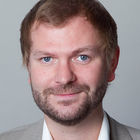Trump and international migration
IOM on the brink?
Schraven, BenjaminThe Current Column (2018)
Bonn: German Development Institute / Deutsches Institut für Entwicklungspolitik (DIE), The Current Column of 25 June 2018
Bonn, 25 June 2018. The end of this month sees the election of a new Director General at the International Organization for Migration (IOM). The most likely candidate for the position is the American Vice President of the evangelical aid organisation Samaritan’s Purse, Ken Isaacs. And he is a true Trump disciple. In the past he has been prominent less as a result of his knowledgeable statements on migration and more for his anti-Islamic tweets. For example, after the terror attack in London in June 2017 he declared that terrorism was exactly what the Koran expected of faithful Muslims. And this man is supposed to lead the “world migration agency”? In view of the challenges of international migration, this is even worse than it initially appears. Although it does not enjoy the same level of public awareness as the United Nations refugee agency UNHCR, the IOM is without a doubt one of the most important international organisations. It was founded in 1951 as the “Provisional Intergovernmental Committee for the Movement of Migrants from Europe”. Its mandate was initially to support European governments in the repatriation of a portion of the over 10 million refugees displaced by the Second World War. Several decades and name changes later – the organisation only received its current title in 1989 – the IOM has become a key global player in the field of migration. Its annual budget in 2014 stood at an impressive 2 billion US dollars and the organisation currently has a staff of around 10,000 in over 480 offices worldwide. In addition, the IOM also states that it supports over 2,400 migration projects around the globe. The IOM is not a humanitarian or human rights organisation, instead seeing itself as an international service agency for states in the field of migration management, control and advising. One common misconception regarding the IOM is that it is the UN umbrella organisation for migration. Although the IOM has been an associate organisation of the UN since 2016, it does not play the role of global organisational or management body for migration issues. It also has no mandate for such a role. The largest share of the IOM budget comprises project-linked funds over which the member states hold sway. And the European member states in particular have long been keen on IOM projects focused on the repatriation of migrants. In this respect (vocal) criticism of the IOM as “evil twin of the UNHCR” is regularly voiced by the human rights organisations Human Rights Watch and Amnesty International. Many activists in the field of asylum and migration are also perturbed that the IOM for a long time made no statement regarding the practice, recently halted by Trump, of separating children from their parents in the event of illegal border crossings. At the same time, signs indicate that the significance of the IOM for the United Nations and the managing of global migration processes is set to grow. The Global Compact on Migration that is currently being negotiated – and from which the USA has removed itself – targets a (non-binding) convention that aims to establish rules for “safe, regular and orderly” migration, in keeping with the UN sustainability goals. According to the first draft of the compact, the IOM is to be assigned an important role in its formation. The goal of the compact is to improve the often marginal and harsh living and working conditions of the approximately 250 million migrants worldwide. It is difficult to say if the two other candidates for the post of IOM Director General – Laura Thompson (Costa Rica) and Antonio Vitorino (Portugal) – have a chance of thwarting Trump’s candidate Isaacs. The IOM has traditionally been led by an American since the 1960s. In addition, there are fears that the US would drastically cut its considerable funding for the IOM were Isaacs not to be elected.
However, if Isaacs became the new boss of the IOM, this would be sure to be welcomed by the fans of total barricading, from Budapest and Vienna to Rome. This would be remarkably shortsighted. Because a restructuring of regular migration would be a key component for overcoming European problems such as demographic change and irregular migration. However, this requires an IOM that acts as partner and honest broker between countries of origin and countries of destination. An IOM acting according to the maxim of “America first” or “Europe first” will not be able to achieve this.


